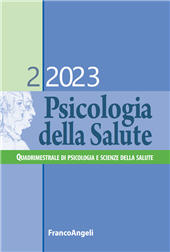La salute mentale delle persone non-binary e genderqueer, transgender binary e cisgender : una revisione sistematica
27-43 p.
Sempre più persone, soprattutto giovani, si identificano come non-binary/genderqueer (NBGQ), identità di genere che va oltre la dicotomia binaria donna-uomo. Tuttavia, le ricerche presenti in letteratura mostrano risultati contrastanti tra loro per quanto riguarda gli esiti di salute mentale. La presente revisione della letteratura vuole essere un aggiornamento della prece-dente revisione di Scandurra et al. (2019) e pone due obiettivi: (1) individuare le differenze di salute mentale tra la popolazione NBGQ e transgender binaria (TB), e (2) identificare le differenze tra la popolazione NBGQ e cisgender. Seguendo le linee guida PRISMA, la ricerca della letteratura è stata condotta nei database PubMed e PsycInfo tenendo in considerazione gli arti-coli pubblicati tra il 2019 e il 2021. N=25 articoli hanno soddisfatto i criteri d'inclusione e so-no stati inclusi nella revisione sistematica. Tutti gli studi inclusi sono cross-sectional.
I risultati rispetto agli esiti di salute mentale tra la popolazione TB e NBGQ sono contrastanti in quanto alcuni studi evidenziano esiti migliori per la popolazione NBGQ, mentre altri evidenziano ri-sultati opposti. Rispetto alla popolazione cisgender, i risultati sono più coerenti, evidenziando peggiori livelli di salute mentale nella popolazione NBGQ. La presente revisione della letteratura ha, quindi, nuovamente evidenziato la necessità di approfondire la ricerca sulla salute della popolazione NBGQ, spesso marginalizzata e invisibile, con il fine ultimo di garantire interventi adeguati per questa specifica popolazione. [Testo dell'editore].
More and more people, especially young people, identify themselves as non-binary/genderqueer (NBGQ), a gender identity that goes beyond the binary female-male di-chotomy. However, research in the literature shows conflicting results regarding mental health outcomes. This literature review, the mental health of non-binary and genderqueer, transgender binary and cisgender people: a systematic review, aims to be an update of the previous review by Scandurra et al. (2019) and has two aims: (1) to identify mental health differences between NBGQ and binary transgender (TB) populations, and (2) to identify differences between NBGQ and cisgender populations. Following PRISMA guidelines, the litera-ture search was conducted in the PubMed and PsycInfo databases taking into consideration articles published between 2019 and 2021. N. 25 articles met the inclusion criteria and were included in the systematic review.
All included studies are cross-sectional. As in the previous systematic review, the results with respect to mental health outcomes between the TB and NBGQ population are mixed as some studies show better outcomes for the NBGQ population, while others show opposite results. Compared to the cisgender population, the results are more consistent highlighting worse mental health outcomes in the NBGQ population. This literature review has, therefore, again highlighted the need for further research into the health of the often marginalised and invisible NBGQ population, with the ultimate aim of ensuring appropriate interventions for this specific population. [Publisher's text].
-
Articles from the same issue (available individually)
-
Information
ISSN: 1972-5167
DISCIPLINES
KEYWORDS
- nonbinary, transgender, salute mentale, revisione sistematica
- nonbinary, transgender, mental health, systematic review


